Plastic Injection Molding: Overview & Benefits of Mass Producing Plastic Molded Parts


Plastic injection molding is a relatively simple process where plastic pellets are fed from a hopper into a heated barrel that has a reciprocating screw. The heat of the barrel and the rotation of the screw turns the plastic into a molten state. The molten plastic is forced through a nozzle into the mold cavity. Once the molten plastic has cooled, the finished plastic component is ejected from the mold.
Although the initial mold design and build can take several weeks, once the mold has been created, the plastic injection molding process can be completed in just a few hours after the mold has been trialed for production. Depending on the volume and complexity of the project, there could be several adjustments and trials that may be needed to the injection mold to get completely ready for mass production.
The speed, efficiency, and accuracy of this process are three of the primary reasons plastic injection molding is often used to mass produce durable plastic parts in many industries, including automotive, consumer goods, and health care.
As mentioned above, plastic molded parts are created from a plastic injection mold. And, these molds generally have high life cycles, so thousands or millions of components can be created just from one mold. Fast production speeds and repeatability makes it ideal for mass production.
Multi-cavity molding has also become commonplace in many applications. As the name suggests, a multi-cavity mold features more than one cavity for the same component. The purpose of multi-cavity molding is to produce even more parts per machine cycle. The target cost of the final production part along with the annual quantities of part requirements will determine how many cavities will be required for the production mold. Your plastic molded parts manufacturer will help you determine the best mold cavitation for your project requirements.
With the continual rise in consumer demand, manufacturers must figure out how to quickly create components without compromising quality; plastic injection molding is one solution to help them overcome this challenge.
Despite being a fast process, the parts produced with injection molding can be incredibly reliable and strong, and that’s because many of the plastic materials, including polycarbonate, polyvinyl chloride, polypropylene, and acrylonitrile butadiene styrene, are known for their high strength and durability. Every custom injection molded part will have it’s own set of functional and appearance requirements. So it is important to work with your plastic molded parts manufacturer to specify a material that will work best for the application.
For example, plastic molded parts made from polycarbonate are known for their exceptional durability, strong impact, weather and heat resistance. Polycarbonate can also offer fantastic optical qualities, while acrylonitrile butadiene styrene is lower in cost but has good tensile strength, impact and corrosion resistance.
Industries like automotive, aerospace, and defense are even using plastic molded parts to replace metal components that frequently experience cracks or failures due to fatigue.
Lastly, plastic injection molding is well-suited for mass production because it is a relatively inexpensive form of manufacturing compared to alternatives. Although the upfront cost of molds can be high, the same mold can produce thousands or millions of parts. Essentially, the larger the production run is, the lower the overall costs are for each unit produced.
Since cycle times are short for producing injection molded parts, finishing a production run takes less time. So per unit labor costs are also lower. Production cycle times for injection molding generally range between 20 and 60 seconds per machine cycle, , depending on the part’s complexity and the design of the mold.
Plastic injection molding also produces little material waste, and that waste can easily be recycled in most cases. Sometimes, the sprues, runners can be recycled for future production runs, helping to further lower costs. Ultimately, injection molding setup times are minimal, production times are short, material waste is low, so overall costs are low.
If you need to mass-produce plastic parts, reach out to MSI Mold. We’re a U.S.A. plastic injection molding manufacturer offering comprehensive, in-house mold making, rapid prototyping, and custom injection molding. We can produce simple and complex components and handle small to large production runs Please contact us today if you have questions about plastic injection molding or to learn more about our services and capabilities.